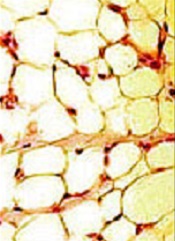
Researchers say they’ve discovered how a lack of the protein adiponectin promotes disease progression in patients with multiple myeloma (MM).
Obesity is known to increase the risk of developing MM, and obese individuals have lower-than-normal levels of adiponectin.
So the researchers set out to characterize the relationship between adiponectin and MM.
They found evidence to suggest the protein induces apoptosis in MM cells by suppressing lipogenesis. And this points to new treatment avenues for MM.
Edward Medina, MD, PhD, of University of Texas Health Science Center at San Antonio, and his colleagues described this research in Leukemia.
The team noted that adiponectin plays several roles in preserving health, including killing cancer cells. And, as levels of adiponectin are reduced in obese individuals, the protein has been implicated in MM progression.
Furthermore, adipocytes in obese individuals produce more fatty acids, and it’s likely that MM cells feed on these fatty acids.
“Synthesizing fatty acids is important for myeloma cells to build vital structures, including cell membranes, that enable them to keep on growing,” Dr Medina said.
With this in mind, he and his colleagues set out to determine how prolonged exposure to adiponectin affects MM cell survival and to describe exactly how the protein works.
Their experiments revealed that adiponectin activates protein kinase A (PKA). This leads to a decrease in AKT activity and an increase in AMP-activated protein kinase (AMPK) activation. Then, AMPK induces cell-cycle arrest and apoptosis.
The researchers said this apoptosis may be mediated, at least partly, by a decline in the expression of acetyl-CoA-carboxylase (ACC), which is essential to lipogenesis.
So the team introduced palmitic acid, the preliminary end product of fatty acid synthesis, to the MM cells and found it prevented adiponectin-induced apoptosis.
In addition, the ACC inhibitor 5-(tetradecyloxy)-2-furancarboxylic acid had an antiproliferative effect on MM cells. But an increase in fatty acids inhibited that effect.
The researchers said this new understanding of the pathways adiponectin uses to kill MM cells might lead to the development of drugs that would function in the same way.
“If we could pharmacologically suppress these fatty acid levels in obese myeloma patients, we could boost the effects of the chemotherapy that targets PKA or fatty acid synthesis and potentially decrease the chemotherapeutic dose,” Dr Medina said. “Also, it would give your own body’s protective measures more of a chance to work against the cancer.”

